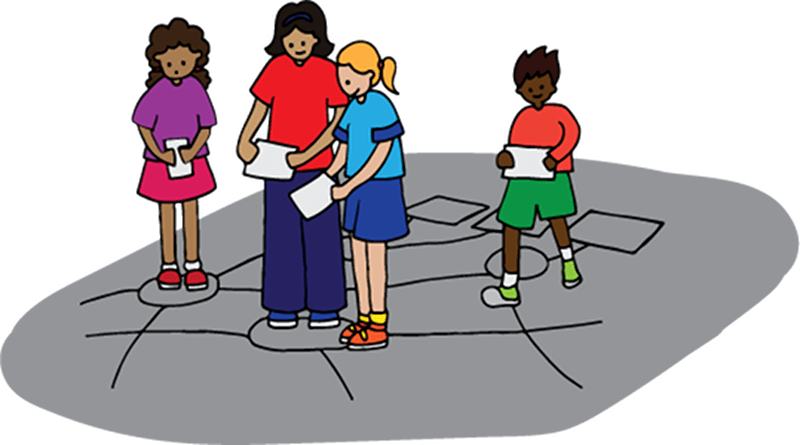There was a time when computers were far too expensive to let mere students use them. In those days, we wrote fake programs for fictitious machines and checked them by hand. That wasn’t fun, but it did teach you to think about the algorithm. You weren’t worried about how many tabs to indent code in the editor, or checking your social media feed, or changing the track on your Spotify playlist. Maybe that was the idea behind Computer Science Unplugged. The site is aimed at educators and gives them lesson plans to teach kids about computer concepts through activities that don’t use a computer.
The target ages are from 5 to 14 and topics range from binary numbers, sorting, searching, error detection, and robotics. For example, one exercise has students line up to be bits in a binary number. Each kid holds a card that is blank on one side or has the right number of dots on the other (for example, bit 0 has 1 dot, bit 2 has 4 dots, and so on).
The lessons do get harder. For the sorting unit, the kids go outside and draw with chalk on the pavement or use tape on the floor indoors. Kids carry cards with numbers through the sorting tree and compare their cards with other students to decide who goes where.
Learning basic ideas about algorithms and data representation without the distraction of a computer can be a very powerful thing. A lot of us learned on computers that existed only in a book or on pieces of cardboard. It gives you a great understanding you can apply to real machines. If you are looking for something more suitable for high schoolers, the same sponsors have that, too.
If you are interested in this sort of thing, we have our own favorite game to play with kids to teach robotics and other computer concepts. Just be sure your insurance is paid up as it is a little dangerous by today’s standards. If you want to teach some basic electricity instead, you could always break some eggs.
















Who remembers those Apple][e workbooks, with the hand-drawn pictures and the printed-out BASIC programs, that described each line of code ?
I do. I also remember having to provide the instructor with a properly formatted flowchart before being let near a keyboard.
I remember em as well. I also recall my dear mother buying a book for the vacation drive that was very similar and quite disappointing about 20 minutes into the 6 hour ride lol. To her credit it had pirates on the front, but the entire inside was tiny blurbs of story along with code you were supposed to input to find out what was happening in the story. Sad part was we didn’t even have a home computer at that point so I could never test it. I kinda wish I still had the book to see if there were errors in it. Good times…
And for those who are wondering how the trip turned out, I think I ended up with a Hot Wheels sticker book a couple of hours down the road that saved the day :)
Here in the UK Brownies/Guides can get the new programming badge without using a computer I believe they write flowcharts
“The Brownies programme, set to be available to 200,000 girls, does not actually involve any computers but allows girls to learn about algorithms and how they work in computer programmes and robots. ”
https://www.telegraph.co.uk/news/2018/04/12/girlguiding-google-launch-badge-get-girls-coding/
Life comes full circle I guess
Thanks Al! That will be very useful for teaching my younger kids.
And only one is boy ;-)
Interesting to see that Telegraph article use the British “programme” throughout.
As a Brit, growing up, “program” was the computer term, and “programme” the term for a TV show or an order of events. I’ve been living in the USA for the last few years. Has the language “over corrected” into using “programme” for computers too?
Oh man ya hit one of my favorite things my British friends and I kid each other about. I have the same understanding about programme vs program that you do. We mainly just jank on each other for pronunciation ala “alyoominium jagyuar rooter in the gairagde” vs aloominum jagwar rowder in the garazhe kinda thing. Lots of fun and good folks :)
Great stuff Williams! I found it difficult to setup all the stuff for my kids to start learning programming. Found the Computer Science Unplugged activities really cool. I also backed this Kickstarter coding card game, Potato Pirates. It’s super fun & ingenious to get the whole family to learn together XD
It’s great that such resources are becoming more and more available. Both as an engineer and a highschool teacher, I recommend the *excelent* work the University of Canterbury did. I first arrived to those sites (CS Field Guide, etc) trough my govt’s educational literature (http://program.ar) Found that unplugged activities are specially good to link the structural and the behavioral aspects of comput(ers | ing).
Cheers